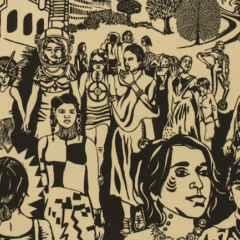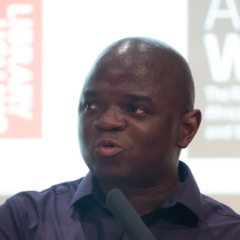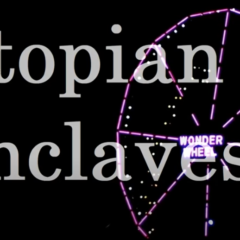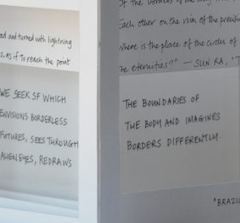LSFRC Reading Group, 2020-21
From Sultana’s Dream, Chitra Ganesh (2018) The London Science Fiction Research Community (LSFRC) are proud and excited to share the theme for their 2020-21 reading groups and conference: Activism and Resistance. The theme is open to be shaped by incoming new team members, but the LSFRC are keen for folks to start suggesting texts for the reading groups. They write: “We are keen to avoid cloistering ourselves within certain forms and media, and welcome suggestions of short stories, graphic novels, poetry, anthologies, theory & essays, games (tabletop and/or digital), artwork, films, novels and more.” The first reading group session will be taking place online on the evening of Monday 12th October and will cover Kwodwo Eshun’s “Further Considerations on Afrofuturism” alongside John Akromfrah’s film The Last Angel of History, which we will be screening before the session. If you aren’t on Facebook and would like you attend the reading group, send us an email (lsfrcmail [at] gmail [dot] com). Activism & Resistance In an age when Me Too, Black Lives Matter, Decolonise the Curriculum, Refugees Welcome, and movements for global solidarity with oppressed populations have become part of mainstream discourse, it is vital to re-examine the relationship between activism, resistance and the mass imagination with regards to science fiction. As a genre dedicated to imagining alternatives, science fiction offers us a space of radical potential which allows for diverse explorations of dissent. It is, also, a space that has been rightfully critiqued for its historic inequities, formed by and favouring white cis-het men. There needs to be reckoning with how precarious bodies engage in activism and resistance in the context of their material realities and restrictions. Therefore, we must deny universalising a single experience as “sufficiently radical,” and instead acknowledge how communities in the margins – queer, disabled, BIPOC, immigrants & refugees, religious minorities, indigenous populations, casualised workers, the homeless and unemployed – have specific ways of subverting and undermining oppressive systems. It is imperative to not only revisit how science fiction has been a space for activism and resistance, but also to resist and challenge the genre’s shortcomings. Indicative texts could include: Chaos Walking trilogy, Patrick NessThe Dispossessed, Ursula Le GuinThe Queue, Basma Abdel AzizSisters of the Revolution, edited by Ann and Jeff VandermeerOctavia’s Brood, edited by adrienne maree brown, Walidah Imarisha and Sheree Renee ThomasDetroit: Become Human, Quantic DreamThe Last Angel of History, John AkromfrahStar Wars, George Lucas“Further Considerations on Afrofuturism,” Kodwo Eshun“2019 John W. Campbell Award acceptance speech,” Jeanette Ng“My Words to Victor Frankenstein Above the Village of Chamounix,” Susan StrykerMarvel Civil War, Mark Millar For more information visit the LSFRC website: http://www.lsfrc.co.uk/ Horizon, Manzel...
Tade Thompson Q&A
We were thrilled to be joined by Tade Thompson, author of the award-winning Rosewater trilogy, for a special Q&A session with students studying on our MA Contemporary Literature and Culture and MA Creative and Critical Writing on 16th November 2020. We had studied Rosewater (2016), the first novel in the trilogy, as a recent example of what Natalia Cecire and Sam Solomon have termed the utopian “mycological promise” of fungi, in which natural, ancient, and magical energy systems convert decay and waste into nitrogen-fixing, plant-sustaining mycelium. Thompson’s trilogy depicts an alien fungal network known as Wormwood that is described as “protecting, nurturing” and is capable of miraculously healing, or worsening the conditions of, disabled people who visit it. Students explored Rosewater within the context of contemporary environmental posthumanism, as a narrative that deconstructs species boundaries between the human, the fungal, and the alien to offer an Afrofuturist speculative vision of what radical botanists and posthumanist theorists would call “becoming-plant,” reanimating the monstrous vegetal in contemporary ecocatastrophe narratives. A huge thank you to Tade for graciously offering his time after a full day's work during a very busy period of the Covid-19 lockdown! You can watch the full Q&A below, which was chaired by Dr Caroline Edwards and Dr Sean O'Brien, both lecturers at Birkbeck. Featured image by RAS News and Events shared under a CC BY-NC-ND...
Utopian Enclaves in Feminist Cyberpunk
One of our talented PhD researchers, Sasha Myerson, has recently produced this video essay on "Utopian Encalves: The City in Feminist Cyberpunk." The video essay replaces Sasha's conference paper presentation at the Cyberpunk Culture conference, taking place online on 9-10 July 2020. Abstract: Cyberpunk is conventionally considered a dystopian genre. But, as Tom Moylan has argued, there is a sharp difference between dystopias of resignation—which capitulate to the logics of neoliberalism—and critical dystopias, which “adopt a militant stance that is informed and empowered by a utopian horizon that appears in the text”. Such texts seek to overcome dystopia, find a way beyond it, and transform the present moment towards utopia. Furthermore, cyberpunk is a genre deeply rooted in urban experience, recalling both the dense neon-soaked streets of William Gibson’s Neuromancer (1984), or Ridley Scott’s Blade Runner (1982), and the hyperreal, fragmented urban spectacle that appears in the works of Jean Baudrillard and Frederic Jameson. Yet, such spectacle is not necessarily synonymous with dystopia. As feminist geographer Elizabeth Wilson writes, “the excitement of city life cannot be preserved if all conflict is eliminated […] life in the great city offers the potential for greater freedom and diversity than life in small communities. This is particularly important for women.” Wilson’s vision of the city calls for a radical embrace of “the freedom and autonomy they offer”, while making such freedom “available to all classes and groups.” This paper will read Emma Bull’s Bone Dance (1991) and Naolo Hopkinson’s Brown Girl in the Ring (1998), both texts that work within the genre of cyberpunk, through the critical lens of Moylan and Wilson. Both authors recognise the contradictions of the city, a space often built upon exclusion and inequality that can simultaneously incubate surprising political alliances and glimpses of utopia. My analysis will focus specifically on two passages, the opening of Hopkinson’s text and the ending of Bull’s, which take the conventions of the cyberpunk city and locate within it the potential for a non-hierarchical, diverse and utopian vision of the city that “shimmers just beyond” their pages Bio: Sasha is a PhD student at Birkbeck College. Her research focuses on urban space and the built environment in 1990s feminist Cyberpunk science-fiction. Examining posthuman and multiple subjectivities, her work explores how such individuals navigate, survive and resist within technologized cities of surveillance and discipline. Sasha is a co-director of the London Science-Fiction Research Community and helps to organise Beyond Gender, a feminist research collective. For more information see here: http://cyberpunkculture.com/cyberpunk-culture-conference/program-friday/%C2%A726-sasha-myerson/...
Upstaging Ireland
Birkbeck's Arts Week is an annual festival of workshops, lectures and activities around the School of Arts in Bloomsbury. In 2020, quarantine measures have meant that all events are taking place online, over several 'Arts Weeks'. As part of this provision, on 1st June, Birkbeck published the podcast Upstaging Ireland: The Theatre of Flann O'Brien. Flann O'Brien (also known as Brian O'Nolan and Myles na gCopaleen) was an Irish comic writer whose work has been considered at a series of previous Arts Week events. This year's contribution is on a lesser-known aspect of his work: his writing for the theatre. The plays Thirst (1942), Faustus Kelly (1943) and Rhapsody in Stephen's Green: The Insect Play (1943) represent an extraordinary burst of dramatic creativity, and were first produced at Dublin's Abbey Theatre and Gate Theatre. The podcast draws on the expertise of Tobias Harris, who has recently produced a doctoral thesis on Flann O'Brien, and Hugh Wilde provides four readings from the plays. It can be heard in full here. Image from Burns Library, Boston College, used under a CC BY-NC-ND 2.0 licence....
Radio During Lockdown
by Emily Best Barring climate change or maybe globalisation, the pandemic crisis of 2020 is arguably the widest-ranging event in terms of human impact since the Second World War. It drops individual instances – statistics, directives, shock photographs of packed roads on sunny days and videos of grandchildren getting hugged through cellophane – into the inertia of waiting. Those staying inside whether through furlough, home working or isolation experience the changes both fast and slow, immediate and projected, via the same screens, on the same sofas and through the same windows as they have and will continue to for months. Modern media and technology allow the documentation and review of every moment – a fact itself observed and commented upon far and wide. Despite isolation, it’s almost impossible for us to insulate. Radio is one of the oldest methods of communication we have, and in wartime it was indispensable both as a weapon of war and a domestic comfort. But when news is so ubiquitous, even inescapable, do people still find it comforting? I asked Leslie McMurtry, author of Revolution in the Echo Chamber: Audio Drama’s Past, Present and Future (2019), about this. She suggested that the ‘liveness’ of radio is what gives it its edge. Perhaps being tuned into a radio is the closest real-time access we can have to the world outside? McMurtry also told me that in the 1920s and 1930s, radio’s advantage worried newspaper publishers. This may go some way to explaining the way the panic caused by Orson Welles' infamous 1938 War of the Worlds broadcast was in fact, thanks to newspapers, blown out of all proportion. Of course, smart notifications and curated echo-chamber style feeds mean that many can get the news they want via alerts on their phones at least as quickly as on the radio. I did a quick poll on social media of my friends’ listening habits during lockdown, and the overwhelming response to live radio was avoidance: ‘sick of hearing bad news’ was the phrase that came up most often. For others, though, radio can still offer companionship, just as early radio did for those in isolated locations outside big cities. One person said that a particular breakfast show DJ knew their musical taste better than another, while others spoke of having it on for the background noise while at home. I fall into this category: working from home I may have a couple of Zoom meetings each day and the odd telephone call, but I don’t have the background hum of voices that fills an office. While intuition might suggest that a quiet workspace would be less distracting,...
CFP – Beyond Borders: Empires, Bodies, Science Fictions
11th-12th September 2020 Keynote Speakers: Dr Nadine El-Enany and Florence Okoye A border, like race, is a cruel fiction Maintained by constant policing, violence Always threatening a new map. from Wendy Trevino, 'Brazilian is Not a Race' The arm twisted and turned with lightning Imperativeness as if to reach the point Of the borders of the day that touch Each other on the rim of the precision-discipline. Where is the place of the circles of the eternities? from Sun Ra, ‘The Arm’ The CCL is excited to announce the Call for Papers for this year's London Science Fiction Research Community (LSFRC) annual conference! This will be the fourth event, which is usually held at Birkbeck, University of London. As a result of the ongoing crisis this conference will have to take place online, with the possibility of some optional in-person elements. We think now more than ever is a time to question the role of borders in our lives and so we want to proceed with this conversation. If you have any questions or concerns about this please feel free to get in touch. Borders are one of SF’s most consistent preoccupations, from alien encounters, to narratives of outer space colonisation and on to the construction of walls between worlds. Moreover, the many barriers to entry in the publishing industry mean that borders also shape the conditions under which we read SF and determine whose SF we read. Borders are not always codified or officially policed. Too often, they are invisible, insidious and supported by supposedly benign institutions. However, while SF has perpetuated the violence of borders, it has also revelled in their transgression. Queer creators, disabled creators and creators of colour have shown us the decolonial and non-binary possibilities opened up by the genre. SF is filled with cyborgs, hybrids and monsters who challenge binary divisions of self/other, animal/human, technological/organic and material/immaterial. The body in SF is frequently broken down, expanded or pushed to its limits, as authors imagine new ways of being and strange erotic couplings. At this conference we will explore not only the ways in which SF makes visible the violence of borders, but also SF which imagines their permeability and deconstruction, SF which goes beyond. As Homi Bhabha has argued, ‘to dwell ‘in a beyond’ is […] to be part of a revisionary time, a return to the present to describe our cultural contemporaneity; to reinscribe our human, historic commonality; to touch the future on its hither side.’ We move beyond in order to touch and change what is happening now – we envision borderless futures in order to transform the borders which...









Recent Comments